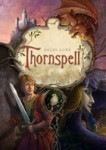Helen Lowe's Blog, page 276
December 10, 2011
Another Great Thing About Summer …
 Paeonies—and from my garden, too!
Paeonies—and from my garden, too!
And in case you were wondering, they really do smell as divine as they look.
Enjoy!
December 9, 2011
Just Arrived: "The Bone People" by Keri Hulme
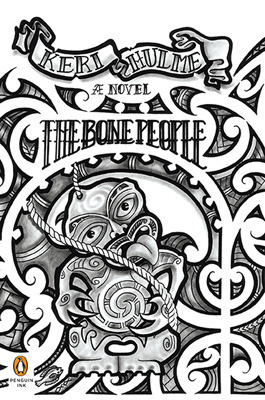 I always feel excited when a new book arrives in my post office box, but some arrivals are particularly special.
I always feel excited when a new book arrives in my post office box, but some arrivals are particularly special.
Like receiving a copy of the Penguin Ink (USA) edition of The Bone People, the internationally renowned novel by Keri Hulme. I think most New Zealand readers will be familiar with The Bone People, which is arguably the most successful new Zealand novel of the past quarter century. It won the 1984 New Zealand Book Award for Fiction and the Booker Prize (now the Man Booker) in 1985 and has gone on to be widely translated and published internationally.
I first read The Bone People in the mid-late eighties and loved it. As someone who had spent 10 years growing up in a remote Maori community, I loved the blend of Maori and Pakeha (NZ European) cultural elements in the story and its overall mythopoeic and magical-realism ethos. Despite the often grim subject matter of child abuse—a sad reality of New Zealand society—the book 'spoke to my heart' in a profound way. And given its success, it undoubtedly spoke to many other readers in a similar way!
My paperback copy from that era has become somewhat well-worn, so it is fabulous to have this newer edition. What is doubly special though, is not just that it has been personally inscribed to me by Keri, but it has the most wonderful cover art.
According to the inside cover, "for seventy five years Penguin has paired the best in literature with the best in graphic design. In celebration of our anniversary, a selection of Penguin's most distinctive contemporay books now features covers especially designed by the world's top illustrative artists."
The cover for this edition of The Bone People features motifs drawn from Maori carving, particularly the hei-tiki and the bird image of Manaia, and is the work of Pepa Heller, a professional tattoo artist who draws inspiration from Maori and Pacific styles. Other than that, well—I think it speaks for itself!
So finally, just for those few of you who aren't familiar with The Bone People, here's the inside cover synopsis:
"The Booker-Prize winning novel, The Bone People, begins in a tower on the New Zealand sea. The woman who lives there is Kerewin Holmes. Part Maori, part European, she is an artist estranged from her art, a woman in exile from her family. One night she is disrupted by a speechless, mecurial boy named Simon who tries to steal from her and then repays her with his most precious possession. As Kerewin succumbs to Simon's feral charm, she also falls under the spell of his Maori foster father, Joe. Out of this unorthodox trinity Keri Hulme has created what is at once a mystery, a love story, and an ambitious exploration of the zone where Maori and European New Zealand meet."
"This book is just amazingly, wondrously great."
—Alice Walker.
December 8, 2011
Book Giveaway Result—from An Interview With Brandon Sanderson
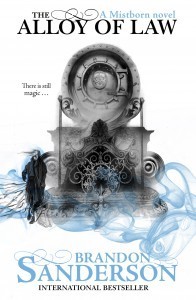 On Monday, I featured an interview with author Brandon Sanderson, here.
On Monday, I featured an interview with author Brandon Sanderson, here.
Brandon's publisher, Gollancz (Hachette) very kindly provided two copies of his latest release, The Alloy of Law, for giveaway, with the recipients to be drawn from amongst New Zealand and Australian commenters on the interview.
The giveaway closed at 12 midnight, Thursday 8 December (NZ time) and the draw has now been made.
And (drum roll!) the winners are:
Tracey Leyston
Ashley Capes
Congratulations to you both! If you email via my website, contact[at]helenlowe[dot]info with your postal addresses, I'll get the books in the mail to you asap.
And thank you to everyone who read the interview, but very much to those who commented and let me know that you'd enjoyed it.
Note: The giveaway was drawn using Random Number Integer.
—
I hope to be back on Monday with another, although much shorter, interview—"Five Fast Questions" with New Zealand speculative fiction author and poet, Tim Jones, about his recently released poetry collection, Men Briefly Explained.
December 7, 2011
Ursula Bethell Creative New Zealand Residency in Creative Writing 2012
I'm delighted to be able to let you all know that I've been awarded the Ursula Bethell Creative New Zealand Residency in Creative Writing 2012 at the University of Canterbury, jointly with David Eggleton, a leading New Zealand poet, editor, critic, writer, and filmmaker. David is currently the editor of Landfall, New Zealand's longest established literary journal.
Needless to say, it is a tremendous honour to be awarded the residency and even more so to share it with a fellow writer of David Eggleton's calibre. At present it is proposed that I hold the residency until July 31 2012, and David Eggleton for the remainder of the year.
The project I will be working on within that period is The Wall of Night Book Three, Daughter of Blood.
—
For those who are not familiar with it, here is a brief description of the Ursula Bethell Residency:
"The Ursula Bethell Residency, jointly funded by Creative New Zealand, was established in 1979 to provide support for New Zealand writers and foster New Zealand writing. The Residency allows authors of proven merit in all areas of literacy and creative activity, including drama, fiction and poetry, an opportunity to work on an approved project within an academic environment.
Applicants should be authors of proven merit normally resident in New Zealand, or New Zealanders temporarily resident overseas."
.

Portrait of Ursula Bethell
Ursula Bethell, 1874-1945, for whom the residency is named, is recognised as one of the pioneers of modern New Zealand poetry and the following summation is from The Dictionary of New Zealand Biography:
"Like others of her generation she was forced to confront the tension between her English origins and sympathies and her New Zealand milieu. In addition she was drawn to examine the disjunctions between religious certainty and everyday experience. Her attempts at developing a poetic voice to express her enlarged understanding were bold and innovative; in all her observations she looked with new eyes."
December 6, 2011
Guest Post on SF Signal: Having Fun with Epic Fantasy
My guest blog post "Having Fun with Epic Fantasy: Making the Grand Tour" has just gone live on SF-Signal—you can check it out right here.
"Making the Grand Tour" is the first of a "Having Fun With Epic Fantasy" mini series that will run over the next few weeks looking—in a light hearted way—at some of the classic tropes of the genre.
So I hope in the lead up to Christmas that we can all have some fun with that!
And as always, I'd love to know what you think, so do feel free to comment on the SF Signal post—let me know your favourite epic fantasy "grand tour" perhaps! 
.
What I've been Doing: All Sorts
 Well as those of you who're following the Brandon Sanderson interview, here, will know, a big part of yesterday involved moderating comments.
Well as those of you who're following the Brandon Sanderson interview, here, will know, a big part of yesterday involved moderating comments. 
Which is great—both to see the following that Brandon's hard work and commitment has generated, and also having the interview I put thought and effort into strike a positive chord for readers. Quite simply, it's all good.
And don't forget the giveaway for NZ and Australian readers, which will close at 12 midnight, Thursday 8 December (NZ time), with the winner announced on the morning of Friday 9 (again, NZ time.) You just need to post a comment on the interview to enter.
—
In between moderating comments I had quite a busy day on the essential but less glamorous side of the writing life, which involved getting tax forms signed ahead of The Heir of Night being published in France next year. As I said to fellow NZ author Keri Hulme recently: whoever imagined when I dreamed the writing dream that I would become so familiar with the provisions of Double Taxation Treaties!
—
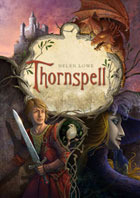 But in-between all that, I did manage to get some work in refining my Thornspell-generated short story, which as I said on Sunday is titled Nameless. I don't know about other writers, but for me the first stage in the creative process is simply "getting the story out there." So I 'write like anything' and get the go-to-whoa of the story into the computer / onto the page. And then I do lots of fine-turning, ie refining—but usually through all that the actual shape of the story doesn't change that much. It's more about nuance. (I think I've talked about this before in relation to The Gathering of the Lost.)
But in-between all that, I did manage to get some work in refining my Thornspell-generated short story, which as I said on Sunday is titled Nameless. I don't know about other writers, but for me the first stage in the creative process is simply "getting the story out there." So I 'write like anything' and get the go-to-whoa of the story into the computer / onto the page. And then I do lots of fine-turning, ie refining—but usually through all that the actual shape of the story doesn't change that much. It's more about nuance. (I think I've talked about this before in relation to The Gathering of the Lost.)
The final stage is when as author you have to give yourself a stern talking to, stop neverendingly fine tuning until you revise your story out of existence, and "get it out there."
And we'll be there very soon with Nameless, I promise!
December 5, 2011
Tuesday Poem: "Unwinding Matariki's Hair" by Jan Hutchison
Gossip about the nits in Matariki's hair
if you must, but when she kneels
close to my chair and I unwind her plaits
I see a dark forest where vines and
glossy tendrils sway a little in the breeze.
And when I sift her hair with my comb,
the comb sings the legend of a hero's love
for a woman in another sphere.
Light falls on Matariki's head
as I cup her chin with one hand
searching for nits with my other.
Gradually
a clip loosens in its lock
and a key turns in our story.
Then between the snap of my thumb
and two fingers
the scissors gleam and wink around
Matariki's temples. And watch!
The wind shimmers through a filament
of hair, a filament that floats out
the window as a thread may float from
an ever-growing story.
But where is Matariki?
The moon has come from the overworld
to gaze at her.
Her head is spiked with small stars.
(c) Jan Hutchison
~ forthcoming in The Happiness of Rain, due out in February 2012 from Steele Roberts.
Posted here with permission.
—
About the Poem:
I first encountered this poem in 2009, when I featured it in the "Poet's Corner," an email series I ran where I invited poets to feature a work and also "speak" to it—so the reader got to hear the poet's voice twice: through the poem itself and through the "Poet's Note" on their own work.
I—together with many far better qualified folk—think Jan is a wonderful poet and I have been meaning to ask if I could feature "Unwinding Matariki's Hair", plus the "note" here for some time. Over the weekend I learned that Jan had just won the Takahe Poetry Prize 2011, judged by Sue Wootton, for another poem "Reading the Book Aloud"—which spurred me on to do this post.
And here, as promised, is Jan's "Poet's Note":
"When I first thought of writing "Unwinding Matariki's Hair," I was staying with our daughter and her family in Hamilton. One night, when we sat by the fire, I watched my daughter combing out the younger child's long plaits. Light fell on the child's head and I imagined myself as a hunter of nits and their dreaded darkness. In the poem, I hoped to capture the rhythm of the comb, the wonder of a quest and something not yet visible. Images were all around me. Here I was in a suburban house close to Waikato swamps and mists where mythic shapes might emerge from water and forest. And here, in this house, all the whanau, old and young alike, dipped in two language pools — Maori and English — in daily conversation. The house added its own voice. Kete, which lay about its floors, sparkled like flounders' fins. Strips of flax hung from racks in the verandah to dry and sang when the wind blew through them. Tree weta, whose behaviour was recorded with scientific exactitude by our daughter, continued their private lives in a cool, dim room at the back. I imagined vines growing there and climbing ever higher. As I wrote the poem, I thought about hair and its mystery. I did not know what was going to happen in the last line. Words and music led me there. The meaning of Matariki's own name offered hope."
Notes (for non NZ readers):
'kete' — a traditional Maori kit bag, woven from flax
'Matariki' — Literally "little eyes", Matariki is the Maori name for the Pleiades constellation, which rises at midwinter in New Zealand to mark the Maori New Year. Last year, I posted about it at winter solstice, here.
'whanau' — extended family group
—
About the Poet:
Jan provided this typically modest bio for herself:
"Jan Hutchison lives with her husband Hamish in Christchurch. From time to time, she writes letters for Amnesty International. A new collection of her poems will be published next February by Steele Roberts called "The Happiness of Rain". Her poems are represented in Snorkel, N.Z. Books, Takahe, Quadrant (Australia) and other publications."
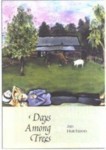 I would add that Jan has published two prior collections, Days Among Trees (2005) and The Long Sleep Is Over (1999) both from Steele Roberts and I believe has enjoyed success in previous poetry awards. At any rate, I unreservedly recommend Days Among Trees, which remains one of my favourite collections of recent years.
I would add that Jan has published two prior collections, Days Among Trees (2005) and The Long Sleep Is Over (1999) both from Steele Roberts and I believe has enjoyed success in previous poetry awards. At any rate, I unreservedly recommend Days Among Trees, which remains one of my favourite collections of recent years.
Also, you can read more about Jan's Takahe win for the poem "Reading the Book Aloud", here.
December 4, 2011
An Interview with Brandon Sanderson—Plus Giveaway
 Introduction:
Introduction:Brandon Sanderson has been one of the exciting new names in Fantasy fiction over the past eight years—commencing with the successful publication of Elantris in 2005, being asked to complete Robert Jordan's epic Wheel of Time series in 2007, and most recently winning this year's Gemmell "Legend" Award for The Way of Kings. So when Ruby Mitchell of Hachette mentioned the possibility of an interview I was delighted to have the opportunity—and am equally delighted to welcome Brandon today.
Hachette have also provided two copies of The Alloy of Law for giveaway—details are provided below the interview.
.The Interview:
Helen: Brandon, to leap right in, you've written a considerable body of Fantasy, with standalones such as Elantris and Warbreaker, the Mistborn trilogy, The Way of Kings (Book One of The Stormlight Archive) and most recently The Alloy of Law—as well as being asked to complete Robert Jordan's long-running Wheel of Time series. Although almost all these works are in the epic/high quadrant of the fantasy compass, there is also considerable diversity in the stories—and all are well regarded. So what, for you, is the "core" to writing compelling fantasy?
Brandon: That is a really hard question to answer. Do you emphasize with the fantasy, or not? A really great story is going to be about awesome characters that you fall in love with. Beyond that, it's going to need a really great plot. You can't separate these things from writing a great fantasy, because while I think the worldbuilding needs to be really cool, if you have terrible characters and plot, it doesn't matter how good your worldbuilding is—you're not going to have a good story.
That said, the core of writing great fantasy as opposed to other fiction, assuming that you're already doing the plot and the character right, is to get down to that idea of the sense of wonder. What is wonderful about this place that would make people want to live there, or be fascinated by it? What's going to draw the imagination?
Fantasy is writing books that could not take place in our universe. For me, that's the dividing line. In science fiction there's the speculation: "This could take place here," or "This may be extrapolating science beyond what we know, but it could work." In fantasy we say, "No, this couldn't work in our ruleset, our laws of the universe." Really focusing on it is what makes the genre tick. So you have to do that well.
Helen: What drew you to write Fantasy as opposed to any other style of fiction? What about the genre "rocks your world?"
Brandon: I became a fantasy writer because of the great fantasy books I read. Other books didn't do it for me. As a young reader (I didn't really like to read), the first powerful fantasy book I read—Dragonsbane by Barbara Hambly—drew me in, captivated me, and took me to this place that could not be but that I wished could be. Nothing else excited me on that level, so that's why I write fantasy.
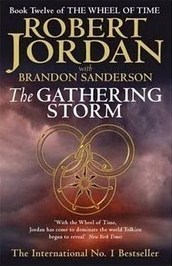 Helen: Dragonsbane is a longstanding favourite of mine as well. And I recall first reading The Eye of the World, the opening novel in Robert Jordan's Wheel of Time series, at about the same time. Being asked to complete such a famous series following Robert Jordan's death was a great honour and compliment to your own writing. But did it also feel like a tremendous responsibility?
Helen: Dragonsbane is a longstanding favourite of mine as well. And I recall first reading The Eye of the World, the opening novel in Robert Jordan's Wheel of Time series, at about the same time. Being asked to complete such a famous series following Robert Jordan's death was a great honour and compliment to your own writing. But did it also feel like a tremendous responsibility?
Brandon: It's been a very humbling experience and a great honor. But it's certainly a tremendous responsibility. When I was considering taking on the project, I thought, "Wow, if I screw this up, I'm in serious trouble. People will find me and burn my house down. Wheel of Time fans are hardcore." I struggled with this, and it almost caused me to say no. One writer I know mentioned, or posted somewhere, regarding this: "This is a thankless job. Anything that Sanderson gets right will be attributed to Robert Jordan, and anything he gets wrong will condemn him."
In the end, I felt I could do a good job on this, and that it could be a sendoff I could give one of my favorite authors, someone who deeply influenced me as a writer. And I felt that if I passed on it, someone else would be found and would get to do it. The question that it came down to for me was, "Knowing that someone who is not Robert Jordan is going to do this, can you really pass and let anyone other than you do it?" And the answer was that I couldn't let someone else do it. I had to do it. So I said yes.
Helen: As well as the Wheel of Time novels, the first instalment of what you have called your own "grand epic", The Way of Kings (Book One of The Stormlight Archive) was published in 2010 and this year won the Gemmell "Legend" Award for Best Fantasy Novel of the Year. Was there any particular significance for you in winning the award for The Way of Kings?
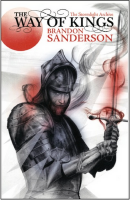 Brandon: Sure. First off, The Way of Kings is the book of my heart—the book I've been working on for years and years. For example, it has a character in it who originated in the very first novel I tried my hand at as a young teen. Finally having this book come out is extremely fulfilling, and having people enjoy it as much as they have is even more fulfilling.
Brandon: Sure. First off, The Way of Kings is the book of my heart—the book I've been working on for years and years. For example, it has a character in it who originated in the very first novel I tried my hand at as a young teen. Finally having this book come out is extremely fulfilling, and having people enjoy it as much as they have is even more fulfilling.
Specifically with the Gemmell Award, I'd lost the award two years in a row—in fact I'd lost three times in those two years, since I had two books nominated one of the years. Finally winning was extremely gratifying and a really big honor. Plus the actual award itself is a battleaxe. That is the best award ever.
Helen: The Alloy of Law is newly out and returns to Scadrial, the world of your Mistborn trilogy, but rather than the medieval milieu of high fantasy, instead comprises a late 19th century world of steam trains and industry. This sounds like steampunk, but The Alloy of Law is also very much a "western" in feel, with a former gun-toting Roughs (Wild West) lawman, Wax, returning to the urban metropolis—yet still ending up fighting the bad guys with his wise-cracking buddy, Wayne. So was that fun to do, blending the genres? And what led you to explore that path with your Mistborn world?
Brandon: I've said that what I love about fantasy is that it can do anything any other genre can do, plus have that added sense of wonder. So I've wanted to explore different types of what fantasy can achieve. The steampunk movement is awesome for doing this. I don't actually consider this book to be steampunk, because the Victorian feel and steam technology aren't there, but it certainly is a cousin to what is happening in steampunk.
At its core, really what I've done is write a detective novel. A buddy detective novel set in an early 1900s industrial age equivalent, in a fantasy world where the epic fantasy that I wrote as a trilogy (Mistborn) has become the mythology for this new world. That concept excited me. What made me do it? The idea that I could, and that I hadn't really seen it done before. That's what fantasy is all about.
Helen: The Alloy of Law also deals with the influence of commerce and industry on events, an element I found in Daniel Abraham's The Path of Dragons as well. Do you see this as a new trend, broadening the traditional fantasy scope—or is it something that has always been part of the mix?
Brandon: I think it's always been part of the mix. Dune, which is one of those hybrid fantasy/science fiction books, is all about this, and is—I would say—the great example of this. It's the foundation for a lot of modern science fiction and fantasy. A fantastic book, and it deals with the idea of how commerce affects a fantasy and science fiction world.
So I don't think it's a new trend, necessarily, but what is a new trend in fantasy is digging into nonstandard (for the genre) types of plots. Moving away from the quest narrative and focusing more on political intrigue, or focusing on the effects of different fantastical elements on a world and its economy. Basically, George R. R. Martin is going this way too, and he's been doing this for 15 years so I can't say that it's a new trend. But it certainly is an exciting direction for the fantasy genre.
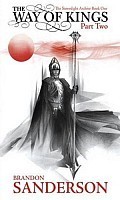 Helen: Magic systems are a strong part of both the Mistborn books, with their allomancy and feruchemy, but also of the Stormlight world, with its fabrials, shardblades and voidbinding. Do you spend a lot of time developing the magic system before you begin writing, or does it tend to evolve with the story?
Helen: Magic systems are a strong part of both the Mistborn books, with their allomancy and feruchemy, but also of the Stormlight world, with its fabrials, shardblades and voidbinding. Do you spend a lot of time developing the magic system before you begin writing, or does it tend to evolve with the story?
Brandon: I spend a lot of hours ahead of time on my magic systems. I am a planner when it comes to worldbuilding. Of course, everything's going to evolve as you work on a book—nothing can be planned out perfectly; there needs to be some freedom, some improvisation to really bring life to it. But I do plan things out a lot, specifically my magic systems. This is a big focus to me, partially because it's become one of my big calling cards in the genre. It lets me add something different, my own take. Granted I'm not the only one who does interesting magic systems, but it has become one of the hallmarks of my writing, and so that's fine with me because it's something that I love to do.
Helen: Elantris and Warbreaker are both standalone novels, but the greater body of your work comprises series. Should this be interpreted as a preference for the series form or do you enjoy both equally?
Brandon: You can indeed interpret that as a bit of a preference. I grew up reading the big classic fantasy series like the Wheel of Time, and I don't think you can do that as a writer like myself without developing a deep fondness and a desire to write your own. So I would say a slight preference, but some of my favorite books are standalones, like Tigana by Guy Gavriel Kay. I do think that the form of the standalone epic fantasy is a really cool one, and one that I want to experiment with more, and one that I like a lot. So while there's a slight preference, I wouldn't say that it's a deep overriding preference. I do what feels right for me for any given story.
Helen: Well, in terms of doing what feels right, your creative output since Elantris was published in 2005 has been very high, including not only seven novels in your own right but also completing Robert Jordan's Wheel of Time, with a two further books published in that series. So I have to ask: how do you do it? (And can I bottle the formula?!)
Brandon: One of the things that you have to remember is that I wrote Elantris back in 2000, so I have a much bigger head start than it looks like. I sold Elantris in 2003, and had all of 2003 up through a big part of 2006 to write the Mistborn trilogy before the first book of that came out. So what you're seeing is my big head start that I had by having that book already done, then launching right into the trilogy.
I don't think I write faster than any other fantasy writers, but I do write a lot. I love to do it; I spend a lot of time doing it, and it's one of my favorite things to do, to tell these stories. So if you want to bottle it, all you really do is spend ten hours a day writing, and boom, you've got it.
But it does look more impressive than it really is, because I have those extra years. A lot of the years where I had two books come out, I had written one much earlier and the other I wrote the year before. My popularity has made my publishers start increasing the publication schedule of some of my books, so you get overlap—a book I wrote long before and then a book I've recently turned in come out at the same time, because when I turn in the new book they want to publish it as soon as I can. So that's why this year, for instance, we only have one book—The Alloy of Law—and it's a very short book. That's because the publication schedule finally caught up to me.
Helen: Brandon, it's still a very impressive achievement—and I'm very pleased that you've been able to make the time in such a busy writing and touring schedule for this interview. It's been a great pleasure having you on the blog today and I look forward to reading the next instalments in both your Stormlight Archive and Mistborn series.
—
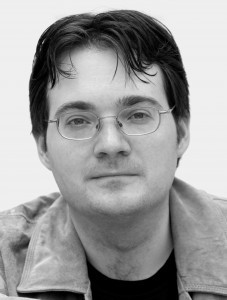 About the Author:
About the Author:Brandon Sanderson has published seven solo novels with Gollancz—Elantris, the Mistborn books, Warbreaker, and The Way of Kings—as well as four books in the middle-grade Alcatraz Versus the Evil Librarians series from Scholastic. He was chosen to complete Robert Jordan's Wheel of Time series; 2009's The Gathering Storm and 2010's Towers of Midnight will be followed by the final book, A Memory of Light, in 2012. His newest Mistborn novel, The Alloy of Law, was released in November 2011. Currently living in Utah with his wife and children, Brandon teaches creative writing at Brigham Young University.
—
Brandon Sanderson's publisher, Gollancz (Hachette), has donated two copies of The Alloy of Law to to be drawn as a giveaway from amongst Australian and New Zealand commenters on this interview. The giveaway will remain open until 12 midnight, Thursday 8 December (NZ time), with the winner announced on the morning of Friday 9. Just leave a comment to go in the draw—and don't forget to check in Friday to see if you've won. The draw will be made by Random Number Integer.
December 3, 2011
What I've Been Doing …
 Fun With Thornspell Short Story:
Fun With Thornspell Short Story:
Firstly, I've finally—finally, dear readers—finished the Rue short story I promised to write as part of the "Fun With Thornspell" series that ran in August through to early September (I'll post all the links below for those who are interested.) But the upshot was that I invited readers to comment suggesting their favourite Thornspell character, with the undertaking that I would write a short story around the character named in the winning comment. In the interests of transparency the contest was judged by Beth Miller, Peter Fitzpatrick and Sharon Stogner—and the character selected was Rue.
I blithely thought that I could deliver the short story in 4-6 weeks and got off to a good start. But then life and 'book business' intervened so it is closer to 10 weeks later that I am delivering the story—but deliver it I shall, sometime later this coming week. The title is Nameless, it's completely free fiction and I hope you'll enjoy—because when I finally sat down and spent the focused time, I very much enjoyed writing it, not least because it was fun to be back in the Thornspell world again.
—
 Another thing I've been working on putting together is an Interview with Brandon Sanderson—which is pretty much complete now and which I think I'll be running tomorrow. If not it will be Thursday, but the way things are shaping I'm pretty sure it will be tomorrow—and I have to say that I think Brandon has given some really interesting and in-depth answers to the questions, so I hope you'll enjoy reading them as much as I have.
Another thing I've been working on putting together is an Interview with Brandon Sanderson—which is pretty much complete now and which I think I'll be running tomorrow. If not it will be Thursday, but the way things are shaping I'm pretty sure it will be tomorrow—and I have to say that I think Brandon has given some really interesting and in-depth answers to the questions, so I hope you'll enjoy reading them as much as I have.
Oh yes—Hachette have given me two copies of The Alloy of Law to give away, so that will also be happening in conjunction with the interview.
—
SF-Signal Guest Post—you may recall that a few weeks ago I did a guest post on SF-Signal titled , "Looking at the Stars: Why Epic Fantasy Keeps 'Speaking' To Us." This last week I have completed another guest post which should be coming up soon. Titled , "Having Fun With Epic Fantasy: Making the Grand Tour" it is intended as the first of a mini series looking at sone of the classic elements of epic fantasy—totally from the point of view of someone who loves the subgenre, but nonetheless in a light hearted way. Anyway, watch this space—or SF-Signal (always worth checking out)—and I'll let you know when it runs.
—
Something else I've done this week is discover Dutch process cocoa. Well, not exactly discover, because I've had it recommended to me many times, so I suppose I should say, discovered the excellence of Dutch process cocoa! You may recall that last year on October 2nd I revealed my "foodie" leaning (or it may have been before that on August 22nd when I talked about a dinner with my friend, CP Lin, and wine and food matches, here) and discussed the virtues of simple food (even more of a virtue when you're going down to the wire on writing projects like books!) In the October 2nd post I included the recipe for a traditional, very simple chocolate sauce recipe, which has always been very good—but made with the Dutch process cocoa: divine!
What's so good about it? It's dark (and unsweetened) but not bitter—apparently because its been treated with alkali (which also means that you can't use it in recipes that rely on baking soda as they likely won't work.)
What else was interesting about it? Well, I kind of blinked at the 'disclaimer' (for want of a better word) on the container: "No forced labour of childen or adults in the production of this product."
"I should per-lurry well hope not!" I thought—and then: sobering that we live in a world where that sort of clarification needs to be printed on a label. In fact, more than sobering: shameful.
And sure makes you hope that you can rely on the disclaimer. As well as wondering about other products that don't carry such disclaimers—which adds a whole new dimension to the food labelling debate.
December 2, 2011
"It Started With A Kiss" On The Supernatural Underground—Plus Giveaway!
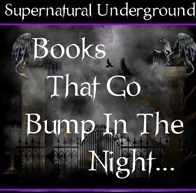 I currently have my first-of-the-month post up on the Supernatural Underground, where the flavour is romance and the importance of "the kiss"—to check it out, click here.
I currently have my first-of-the-month post up on the Supernatural Underground, where the flavour is romance and the importance of "the kiss"—to check it out, click here.
I'm also giving away a couple of books, to be drawn from those who comment on the post:
The Language of Flowers by Vanessa Diffenbaugh
Graveminder by Melissa Marr
and my own Thornspell—because there's no denying that "the kiss" does play it's traditional part in the story!
The giveaway runs until midnight Saturday 3, US Eastern Standard Time.

